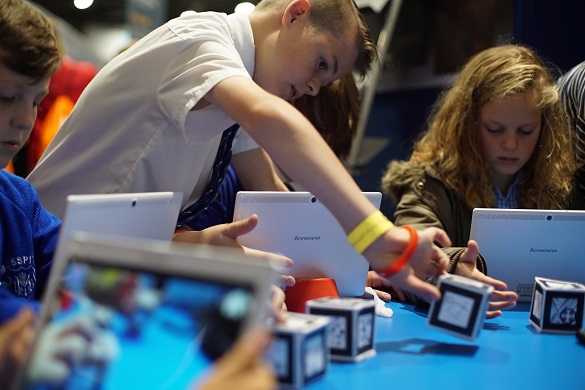Dr Chris Edmonds, from the University’s Department of Physics, has been awarded the 2021 Institute of Physics Daphne Jackson Medal and Prize in recognition of his `exceptional contribution to physics education, by improving access for the visually impaired, enhancing teacher training and creating award-winning teaching materials’.
A lecturer with a background in accelerator science and a passion for inclusive education, Dr Edmonds (below) has been involved in numerous innovative outreach and engagement activities that aim to enhance physics education and communicate the importance and excitement of physics to a range of communities and audiences.
He co-created and delivered the Tactile Collider project, an immersive workshop that teaches visually impaired students about particle accelerators in a fun, accessible way. The project provided much needed opportunities for young people with visual impairments to learn about physics through the use of soundscapes and specially developed tactile objects. It has also overseen the development and delivery of continuing professional development sessions, enabling teachers to communicate physics research to VI-inclusive audiences.
Dr Edmonds also created acceleratAR, a first-of-its-kind augmented reality app that enables anyone with a smartphone to build a particle accelerator on their coffee table.
He was the academic lead behind Interaction Point, a collaboration with arts organisation FACT, which looked at ways art and accelerator science can be brought together to explore multidimensional perspectives and allow people to explore physics using their own language.
During last year’s lockdown, Dr Edmonds also designed home lab kits and interactive learning strategies to ensure students continued to gain hands-on lab experience.
He said: “This IoP award recognises projects that have enabled me to work with people from a wide range of backgrounds, which has been an incredibly interesting and rewarding experience. It’s an honour to have been recognised by the IoP for this work, and I look forward to continuing to make science education accessible for all.”
Professor Carsten P Welsch, Head of the Liverpool Physics Department, said: “Congratulations to Dr Edmonds for this fantastic award! His work has enhanced university physics teaching, improved public understanding of accelerator science and raised young people’s aspiration towards science.“
Institute of Physics President, Professor Sheila Rowan, said: “On behalf of the Institute of Physics, I warmly congratulate all of this year’s Award winners. Each and every one of them has made a significant and positive impact in their profession, whether as a researcher, teacher, industrialist, technician or apprentice.
“Recent events have underlined the absolute necessity to encourage and reward our scientists and those who teach and encourage future generations. We rely on their dedication and innovation to improve many aspects of the lives of individuals and of our wider society.”
The Institute of Physics (IOP) is the professional body and learned society for physics, and the leading body for practising physicists, in the UK and Ireland. Its annual awards proudly reflect the wide variety of people, places, organisations and achievements that make physics such an exciting discipline.
